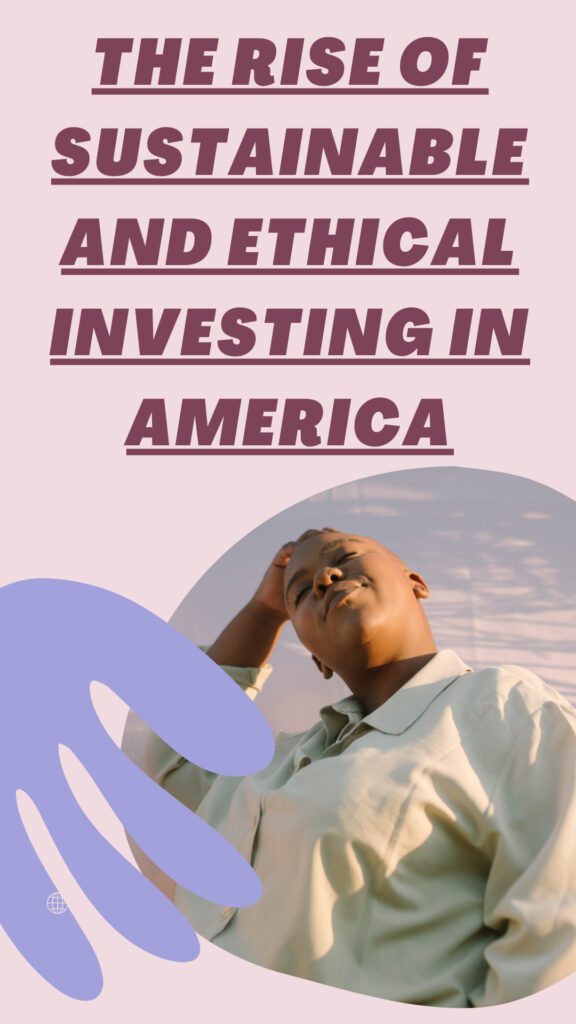In recent years, The Rise of Sustainable and Ethical Investing in America has transformed the landscape of finance and investment. Investors are now looking beyond traditional financial returns and actively embracing ethical and sustainable investment practices. This remarkable movement, often referred to as Sustainable Responsible Investing (SRI), has gained substantial momentum across the United States. In this article, we will delve into the concepts of ethical and sustainable investment, explore their historical roots, and analyze the key factors propelling their rapid ascent. Furthermore, we will examine the fundamental principles that underlie Socially Responsible Investing (SRI).
Understanding Ethical and Sustainable Investment
Ethical and sustainable investment, frequently used interchangeably, represents an investment approach that encompasses not only financial gains but also considers the environmental, social, and governance (ESG) factors linked to a company or investment opportunity. It seeks to align investments with an individual’s values, fostering positive change while avoiding associations with businesses or practices that are detrimental to society or the environment.
Ethical investment is centered around avoiding investments in companies involved in activities such as tobacco, weapons, or gambling, which may conflict with an investor’s moral or ethical principles. Sustainable investment takes a more proactive stance by actively seeking companies and projects that contribute positively to ESG factors, such as clean energy, healthcare, or education.
The Historical Context of Sustainable Investing
The historical context of The Rise of Sustainable and Ethical Investing in America stretches back to the 18th century. However, it gained significant prominence in the mid-20th century with the emergence of socially responsible investing. The 1960s and 1970s witnessed heightened concerns about issues like apartheid in South Africa and the Vietnam War, prompting investors to begin divesting from companies associated with unethical practices and conflicts.
The modern era of sustainable investing gained momentum in the late 20th century when financial institutions and asset managers introduced dedicated funds and strategies centered on ESG criteria. The 1990s marked the inception of the term “socially responsible investing” and the establishment of industry standards, such as the United Nations Principles for Responsible Investment (PRI).

Why The Rise of Sustainable Investing is Growing
- Increased Awareness: Growing environmental and social concerns, coupled with enhanced corporate transparency, have elevated investor awareness regarding the consequences of their investments.
- Generational Shift: Younger generations, such as Millennials and Gen Z, exhibit a heightened social and environmental consciousness, actively seeking investments that align with their values.
- Strong Financial Performance: Research consistently demonstrates that companies with robust ESG performance often display greater resilience and financial success, making them attractive investment options.
- Regulatory Impetus: Governments and regulatory bodies have begun endorsing or mandating ESG disclosure, compelling companies to adopt more sustainable practices.
- Institutional Engagement: Prominent institutional investors, including pension funds and endowments, are increasingly integrating ESG considerations into their investment strategies.
Exploring the Concept of SRI (Socially Responsible Investing)
SRI, an integral facet of The Rise of Sustainable and Ethical Investing in America, represents an investment strategy that thoughtfully considers not only financial returns but also the ethical, social, and environmental impacts of investments. It often involves screening out companies involved in controversial activities while actively selecting investments that facilitate positive change.
SRI strategies encompass various approaches:
- Negative Screening: The avoidance of investments in companies associated with activities like tobacco, weapons, or fossil fuels.
- Positive Screening: The active pursuit of companies with robust ESG performance and sustainable business practices.
- Shareholder Engagement: Engaging with companies to advocate for enhanced ESG practices through dialogue and shareholder resolutions.
- Impact Investing: Allocating capital to projects and companies that deliver measurable, positive social or environmental benefits.
Conclusion
The Rise of Sustainable and Ethical Investing in America has transcended being a niche investment strategy; it has evolved into a dynamic movement reshaping the financial landscape of the United States and beyond. As investors increasingly prioritize values alongside financial returns, the integration of ESG factors into investment decisions is rapidly becoming the new standard. Sustainable investing not only aligns portfolios with personal values but also contributes to a more sustainable and equitable future for all. As this momentum continues to surge, it will undoubtedly play a pivotal role in shaping the future of finance and the global economy.

